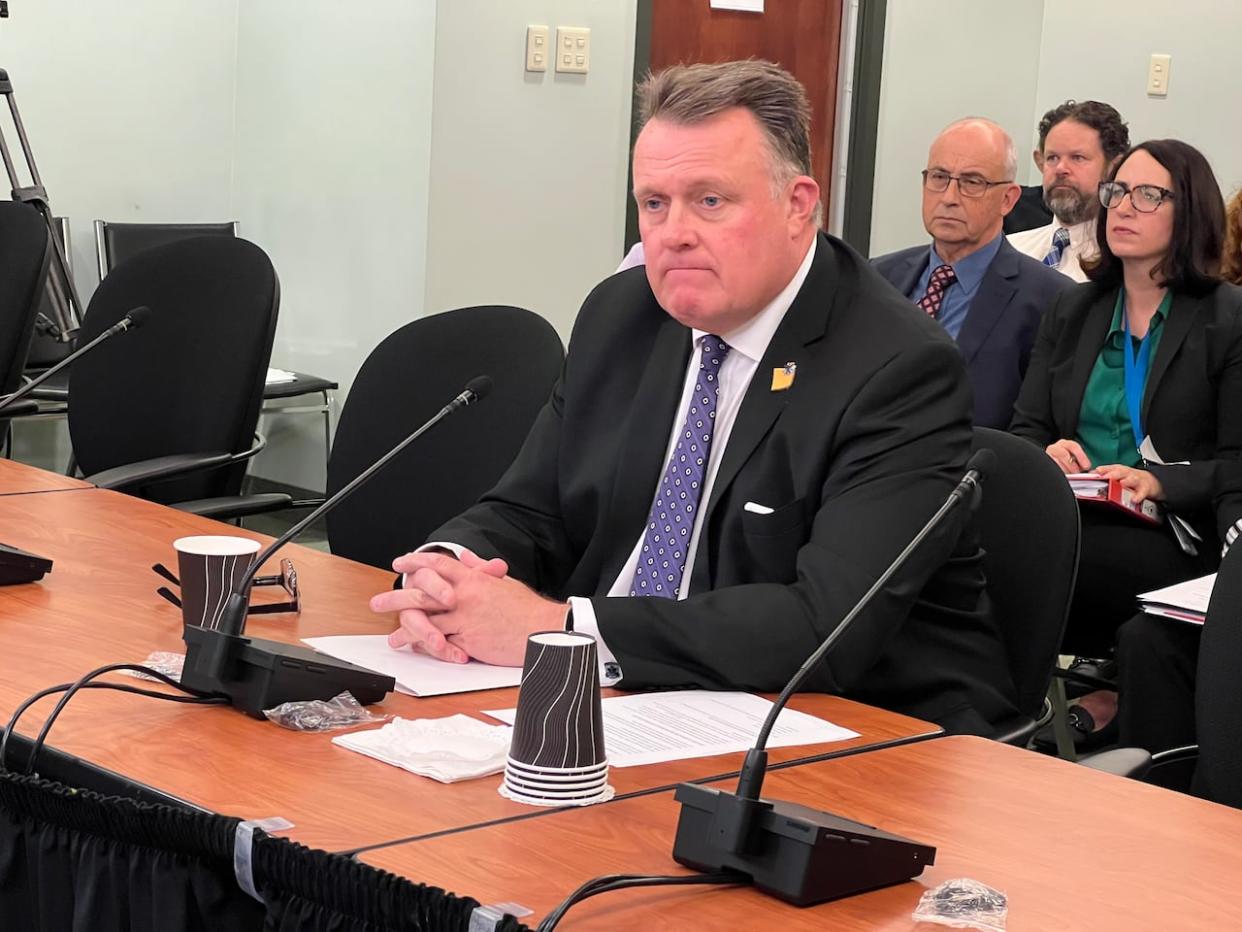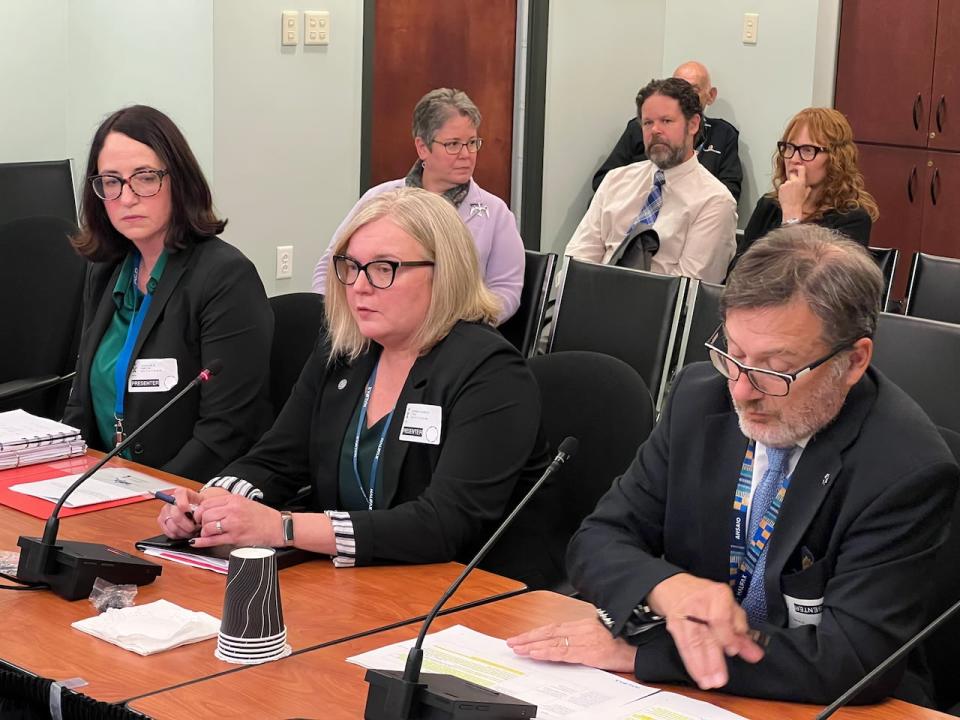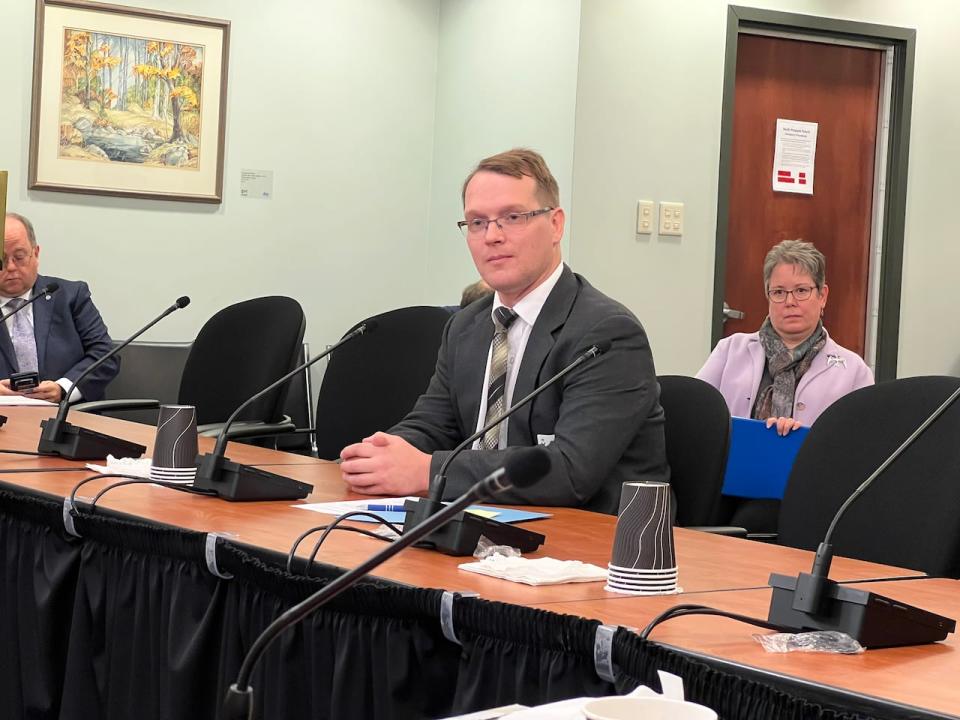Municipal officials decry 'autocratic intrusion' of Bill 329 to law amendments committee

Officials with Halifax Regional Municipality on Monday blasted a piece of legislation from the provincial government that would give sweeping powers to a single cabinet minister to make development decisions in the municipality.
One by one, elected officials and municipal staff made the argument that Bill 329 is unnecessary, an infringement on their autonomy and harmful to democracy.
"This legislation is built on a demonstrably-false premise, introduced with absolutely no notice or discussion," HRM Mayor Mike Savage told MLAs on the legislature's law amendments committee.
"It is an autocratic intrusion into municipal affairs and completely ignores the biggest problem that it claims to address."
Bill 329 would give Housing Minister John Lohr the power to effectively approve whatever development in HRM he wants, irrespective of the wishes of regional council or community councils.
Special access to the minister
When he tabled the bill last Thursday, Lohr said it was intended to speed up the development of housing in the municipality in the midst of a housing crisis and cut through approval processes and other issues that have prevented some developments.
Lohr has yet to provide an example of HRM policies doing any such thing in the last year.
On Monday, Savage and other members of council said it's market factors including high interest rates and skilled labour shortages that are delaying any potential projects, not the policies of the municipality.
"RIght now more than 11,000 units are completely approved — bills paid by the developer ready to go — but a big percentage of those are not being built," he said.
"We've enabled another 250,000 housing units that can be developed basically as of right. When developers and property owners are ready to move forward, HRM will support their projects with streamlined approvals and processes," Savage added later.
Multiple officials pointed out that Lohr brought the legislation forward without any consultation with the municipality and without any advance notice. Savage also questioned the part of the bill that would allow developers to go directly to Lohr, rather than following the existing planning process.
"The kind of developer who would want a special access to a minister I don't think is the kind of people we want building our communities," Savage said.

Cathie O'Toole (centre) is CAO of Halifax Regional Municipality. (Jean Laroche/CBC)
District 13 Coun. Pam Lovelace took issue with the bill's ability to allow Lohr to designate the entire municipality as a special planning area. She said shutting the municipality out of the conversation can lead to poor planning decisions that can create safety concerns.
Lovelace pointed to the province's recent announcement of a long-term care home in Westwood Hills, an area near the site of the recent wildfires, that lacks adequate egress.
"That's why we want to be at the table, so we can speak to you about better planning and the impact to our emergency services and first responders and also the lives and safety of those residents," she said.
Lovelace and others pointed out that the province seems to have no problem dropping legislation on them without notice or consultation, but would not grant them permission to offer commercial tax relief to businesses affected by the wildfire.
Bill 329 could lead to tax increases, says CAO
The municipality's CAO, Cathie O'Toole, said the portion of the bill that freezes development and building fees for at least the next two years — fees she said are among the lowest in the country — could ultimately lead to a reduction in services or the need to increase taxes to make up for the shortfall that comes from developments that do not cover the costs of their own service needs.
"If growth does not pay for growth, then existing taxpayers and utility ratepayers pay for the cost of new growth," she told the committee.
District 5 Coun. Sam Austin said that limiting fees could have a direct impact on the city's ability to assist in the construction of affordable housing because it would end their ability to collect density bonusing and enable inclusionary zoning, the latter being something the city worked for years to get the province to finally allow.
"This feels like a colossal waste of everyone's time and effort," he said.
Austin said funding raised through density bonusing this year has allowed the municipality to provide non-profit groups with $1.2 million toward affordable housing projects that helped create or repair 196 units of "truly affordable housing."

HRM Coun. Sam Austin was one of the people who appeared at the law amendments committee to discuss Bill 329. (Jean Laroche/CBC)
District 7 Coun. Waye Mason said the government is making decisions with no evidence to back up its approach. He noted that it comes just as the Tory government backed away from a promise to release a provincial housing strategy.
Mason said the municipality and province as a whole need a plan so the public understands the government's approach and all levels of government can work together.
"There is no need for this to be done behind closed doors. There's every reason for a thorough, evidence-based public and accountable discussion that puts all our cards on the table. There is no reason for a shoddily-conceived backroom deal leading to legislation sprung on the city at the last minute."
Mason said he is particularly frustrated that, while the majority of homeless people living in the city are in his district, Lohr refuses to meet with him to discuss the situation.
Developer favours province's intervention
Brenda Chisholm-Beaton, the mayor of Port Hawkesbury and president of the Nova Scotia Federation of Municipalities, said the province's actions with the bill ignore the mandate voters gave municipal councillors.
The legislation is "a step back" in a relationship she thought was getting stronger as the province and federation negotiate a new memorandum of understanding, Chisholm-Beaton said, and it's troubling that one person could be granted so much power over a municipality.
"This should be a cause of concern for absolutely everyone. Bill 329 is a major step backwards for municipal autonomy."
One person who isn't concerned about the bill is developer Peter Polley.
Polley told MLAs that inaction on housing by governments at all levels created the climate for the housing crisis and that it's only the private sector that can truly solve the problem.
To that end, Polley said he welcomed the intervention of the province to address long-standing concerns he's voiced before about the planning office at HRM.
Tory MLAs on the committee used their majority to send the bill back to the House without amendments or delay. It could be passed as soon as this week.
MORE TOP STORIES


